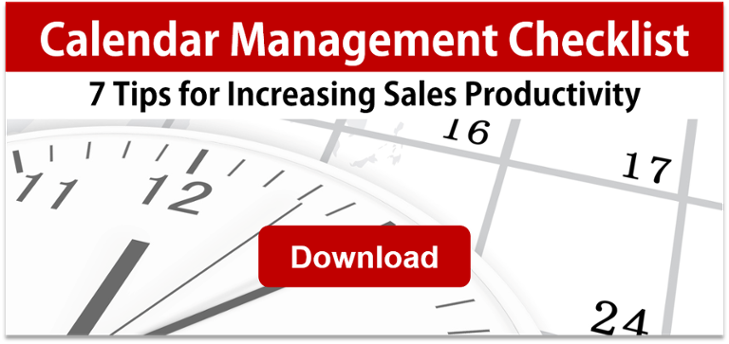Ask These 4 Questions for More Effective Calendar Management
Sales Tips | Sales Management | sales tools | Time Management
Effective time management is arguably one of most important skills for sales professionals to have.
However, according to research from The Bridge Group, sales productivity is the #1 challenge for almost 65% of B2B organizations.
Increasing sales productivity and providing time management tips have become a catchall solution to this growing challenge, but have you ever considered that the root cause of the sales team’s problem may not be about managing time, but rather managing attention.
The best sales organizations help their salespeople maximize time spent on high value tasks and opportunities while minimizing time spent on low impact or dead end opportunities.
When I coach sales teams, I need to first understand how each salesperson is using their time and what activities they are prioritizing. To do that, apply the following questions to assess your current level of calendar usage and how you can improve your skills in order to increase sales productivity.

Question #1: How many appointments do you have scheduled over the next month?
This questions is important because it provides insight into how much prospecting and/or account management is happening over the course of a month.
Sure, each month is different, but when you have an understanding of how many appointments you need per month in order to reach your quota, then you’re able to use your calendar as a measure for success.
If you’re finding gaps and a lot of free time in your schedule, then consider that a warning or red flag that means you need to increase your prospecting efforts in order to fill your pipeline and your calendar.
Question #2: How much time per month are you dedicating to activities that will help you achieve a long-term goal?
Setting and achieving long-term goals is a process. It’s a process that first starts with recognizing what you want to achieve, and then putting a plan in place to actually get it done. It also means holding yourself accountable.
For example, let’s say you’re working on major project like writing a book, which could take 6 months up to a year. Each week, it’s critical that you take a small step forward. But in talking to a lot of aspiring entrepreneurs about long-term goals, I found one of the most common errors made was not taking into consideration the importance of aligning your current day-to-day schedule with future goals. In other words, if you don’t make time today, then you won’t make progress tomorrow.
You can avoid this error by scheduling an appointment with yourself every day or week, depending on the urgency of your goal, where you spend time assessing and measuring your progress as well as taking an action that contributes to your overall plan.
Question #3: How often do you schedule time to work on your business instead of in your business?
There is a major difference between working on your business versus in your business. When you’re working on the business, you’re focused on the company vision, building a strong team, and high level improvements. Whereas when you’re working in the business, you’re focused on the day-to-day minutia and operations. When applied to sales, think of your “business” as your approach to selling.
This means you need to spend time looking at your sales strategies and techniques from both of these perspectives. You can do this by scheduling an appointment with yourself to review the following items.
What to think about when you’re working “in” the business:
- What project or task should I be focused on right now?
- What does my sales pipeline look like?
- Am I making progress towards my sales goal for the month?
What to think about when you’re working “on” the business:
- What daily tasks would benefit from being automated?
- What kind of professional development or training should I be doing?
- How do my KPIs from this month compare to last month? Or this quarter compared to last quarter?
While this certainly isn’t a complete list of key points to consider, it is a starting point to help you understand the distinction between these two ways of thinking and planning.
And if you’re not currently using a tool to help you track, measure, and organize these things, then check out my C.L.E.W. report here to get a jump start.
Question #4: How often do meetings creep into your calendar that you weren’t prepared for?
Being in sales means making every effort to be as organized and prepared as possible. While we know it’s unrealistic to think a surprise meeting or phone call won’t pop up, but there are a few things you can do to limit that from happening.
First, as mentioned above, when you schedule appointments with yourself to work on your priorities, you’re less likely to have your time taken because your calendar will show you’re busy during that time. And usually if someone is trying to coordinate a meeting with you, they will either ask if you can move something around, or they will avoid that day/time altogether because it’s shown as busy.
Second, review your calendar at the end of each day for the next day, and at the end of each week for the following week. This will not only help you manage your time better, it will also provide an opportunity to assess where you can schedule more time into your day or week to work on key projects and priorities as well as items that need to be rescheduled or moved to the backburner.
Finally, make sure your calendar reminds you about 10 to 15 minutes before a meeting. This not only alerts you of the upcoming meeting, but also gives you a chance to wrap up what you’re currently working on and switch gears to the next meeting. This is important because it gives you a chance to clear your head before going into the meeting, and provides an opportunity to review any last-minute information to help remind you of the details that will be discussed.
Conclusion
When used properly, your calendar can be one of your greatest sales tools. It acts as both a sales preparation and planning tool, while also keeping you focused and up-to-date on time sensitive items.
Use the 4 questions mentioned above to assess how you are currently using your calendar and what improvements can be made in order to leverage your time more effectively, which ultimately leads to an increased level of sales productivity and a renewed sense of control and organization.
Remember, the best salespeople maximize time spent on high value tasks and opportunities while minimizing time spent on low impact or dead end opportunities.

About Steve Bookbinder
Steve Bookbinder is the CEO and sales expert at DMTraining. He has delivered more than 5,000 workshops and speeches to clients all over the world and has trained, coached, and managed more than 50,000 salespeople and managers. Steve continuously refreshes his training content to reflect his latest first-hand observations of salespeople across industries and regions. Through him, participants in his workshops and coaching sessions learn the best practices of today’s most successful sellers and managers across industries. Steve understands that sales is a competitive game. To outperform competitors and our own personal best results, we need to out-prospect, out-qualify, out-present and out-negotiate everyone else, not merely know how to sell. Through his specialty programs in Pipeline Management, Personal Marketing, Great First Meetings, 2nd-level Questioning, Sales Negotiating, and Sales Coaching, Steve trains sales teams to master the skills they need to overcome the challenges they face in today’s world… and keep improving results year over year.




